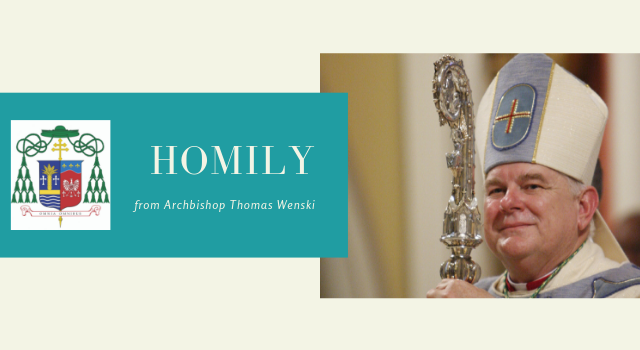By Archbishop Thomas Wenski - The Archdiocese of Miami
Archbishop Thomas Wenski preached this homily during a Mass at St. Lawrence Church, North Miami Beach, March 17, 2019. After the Mass, he blessed and dedicated a new rectory and parish offices.
I am sure that most of you have seen those TV shows whose premise is to give a participant a “Make-Over.”
For example, the Today Show from time to time features what they call an “Ambush Make-Over.” A plain person is given a new hairdo, new clothes, sometimes new body parts – and this is done for our entertainment. The Make-Over is at most skin deep – and it is not really apparent whether the make-over “reveals” or “hides” the person’s real self.
We could say that St. Lawrence in the past several months has undergone a “make-over” of sorts. You have a new pastor, new parish offices and rectory – which we will bless after Mass. And, you are not finished yet.
Now, in today’s Gospel, Jesus undergoes a sort of make-over. His face becomes radiant, his clothes as bright as the sun. However, his “make-over” is not just on the surface. It comes from within himself – and this is not done for our entertainment like those TV “make-overs” but rather for our edification. And Jesus’ make-over answers some real questions about who this Jesus really is – we hear God’s voice say: This is my chosen son, listen to him.
And, of course, what happened to Jesus would not be really understood until after his death and resurrection – for this happens on Mount Tabor, a stopover during Jesus’ journey or “exodus” towards Jerusalem where he will suffer, die and rise again. Jesus is going to Calvary, to the Cross. But his “make-over” on Mount Tabor tells us something about who Jesus is and what his mission was – he is the Son of Man, who has come into the world to redeem the world through his death and resurrection. Moses and Elijah are there – to explain that all what they had spoken and written in the Old Testament was to prepare for the coming of Jesus and for what he would do.
And why would Jesus suffer and die? To make possible our own “make-over,” and not just a superficial one, one on the outside, but one in the inside, one that changes us and makes us over into sons and daughters of God.
And who would not want such a “make-over” – and who doesn’t need one? How can we transform ourselves? How can we transform the world? Too often, in our attempts to “make over” ourselves and our world, we do violence to ourselves and to the world. Look what happens to those politicians that promise people a “heaven on earth.” They usually end up delivering not a Paradise but a hell on earth.
Even today, people trust too much in love of power – to try to make over themselves and others. Yet Jesus tells us that the way to a true make-over is not through the love of power, but through the power of love – and the power of his grace.
The power of love is shown in his gift of himself – by his dying on the cross. This is how Jesus will accomplish his ultimate make-over; and this is the way for us and our being made over into the image of Christ.
Peter would have like to have stayed on Mount Tabor – and sometimes we have had similar “mountain-top experiences” that we wish would never end – a time perhaps when God seemed particularly close to us or like the time we first fell in love. But then life calls us back to reality. Peter didn’t know what he was saying. He – like all of us must do – had to come down the mountain. For Jesus, for Peter, and for each one of us, the road to glory – that final make-over that awaits us in heaven – passes along the Way of the Cross.
The Mass makes the cross present to us. Each Mass is a re-presentation – albeit an un-bloody one – of Christ’s Sacrifice on Calvary. The Eucharist – as a Memorial of His Passion and Death – reminds us that the power of Christ’s love can make us over – and our communion in His Body and Blood renews us. The Mass anticipates that final make-over – because we eat the spiritual food of His Body and Blood, not to turn it into ourselves, but that it might make us over into him whom we receive.

